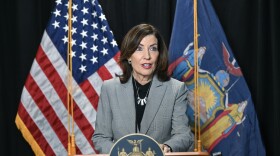Gov. Andrew Cuomo is creating another ballot line for the November elections -- the Women’s Equality line.
Kathy Hochul, Cuomo’s running mate, lieutenant governor candidate and former western New York congresswoman, announced the formation of the new ballot line at a press conference with women supporters near a statue of Eleanor Roosevelt on Manhattan’s Upper West Side.
“It’s time we organized our own movement led by our own political party,” Hochul told the cheering crowd.
For the past two years, Cuomo has tried and failed to get a 10-point Women’s Equality Act approved in the state legislature, due to opposition from Republicans, who co-lead the Senate, over an abortion rights provision. Democrats do not have enough votes to pass the measures themselves.
The ballot line could energize women voters, and it also highlights the differences between Cuomo and his GOP opponent, Rob Astorino, who is pro-life.
A spokeswoman for Astorino says Cuomo is playing politics with women’s rights .
The Women’s Equality ballot line could also draw votes from the left-leaning Working Families Party. They endorsed Cuomo for reelection after the governor, under pressure, released a video speech promising to work for a number of specific issues.
Several thousand signatures are needed to achieve the new ballot line, the fourth that Cuomo and Hochul will run on, but that is not expected to be an obstacle. The other lines are the Democratic Party and the Independence Party.
Republican candidate Astorino is running on the Conservative and the Stop Common Core ballot lines.








